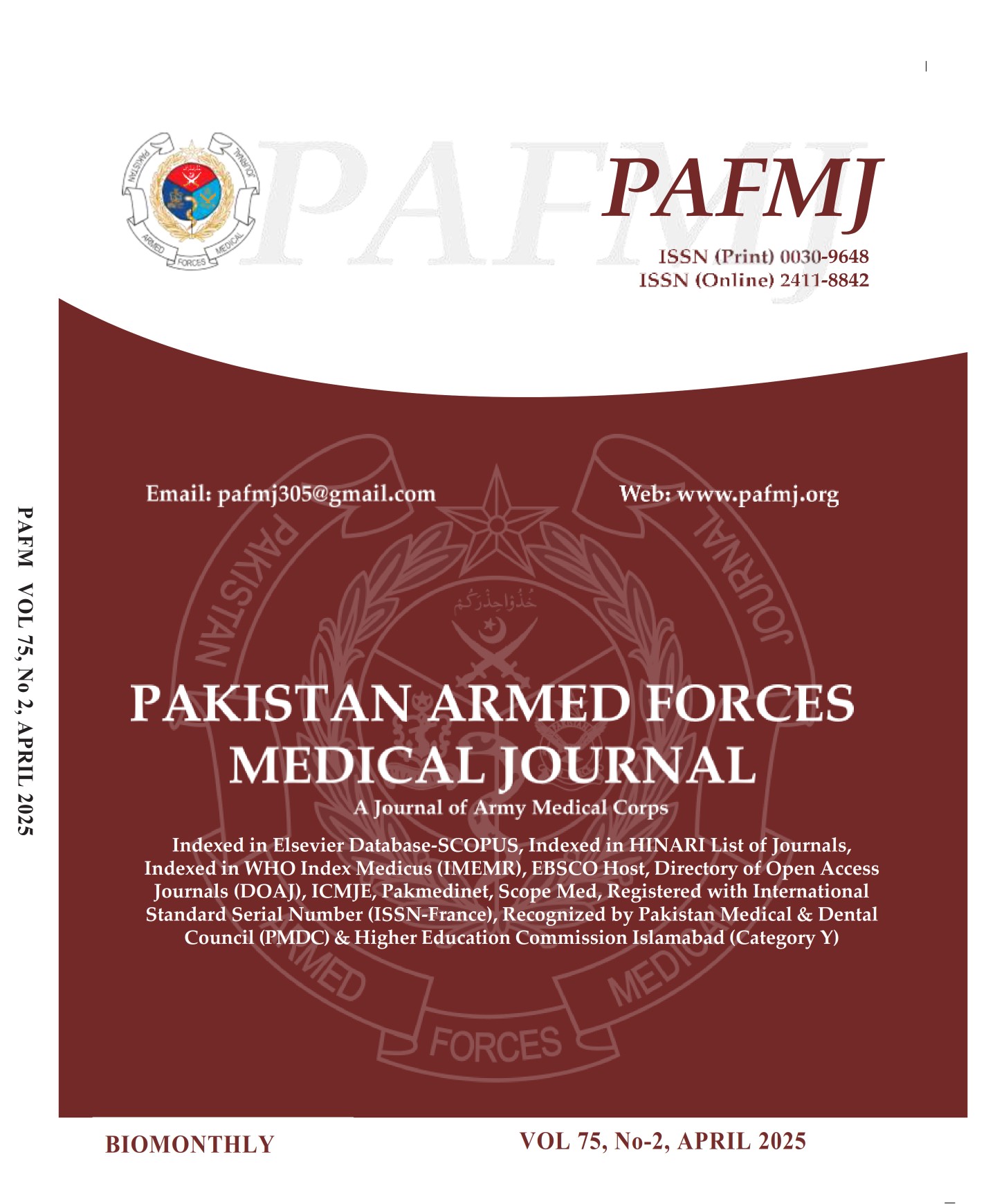Impact of Academic Stress on Sleep Patterns among Medical Students of Army Medical College, Rawalpindi, Pakistan
DOI:
https://doi.org/10.51253/pafmj.v75i2.12552Keywords:
Academic Stress, Medical students, Sleep qualityAbstract
Objective: To estimate the frequency and association between academic stress and sleep quality among medical students of Army Medical College, Rawalpindi, Pakistan.
Study Design: Cross-sectional analytical study.
Place and Duration of Study: Army Medical College, Rawalpindi Pakistan, from Jul to Sept 2023.
Methodology: Data from 280 students were obtained using non-probability convenience sampling. Medical students at Army Medical College, Rawalpindi, Pakistan, aged 18 to 25 years were included in the study. Students having anxiety disorders and diagnosed cases of sleep disorders were excluded. An online questionnaire was used to evaluate academic stress and sleep patterns.
Results: Out of the 280 participants of the study, 246(87.8%) reported that they experienced academic stress. Academic stress scores showed that 161(57.5%) respondents experienced high levels of academic stress. Poor sleep (PSQI score 5-21) was seen in 225(80.3%) participants. A significant association was found between academic stress and sleep quality (p=0.009), sleep latency (p=0.045), sleep duration (p=0.015), sleep disturbances (p=0.024), daytime dysfunction (p=0.043), and subjective sleep quality (p=0.001).
Conclusion: A large proportion of participants from the study setting experience academic stress and have disturbed sleep patterns with poor sleep quality. Both variables are seen to be associated with each other. A greater percentage of females experienced academic stress than males, but subjects having poor sleep quality comprised almost equal percentages of males and females.
Downloads
References
Brand S, Kirov R. Sleep and its importance in adolescence and in common adolescent somatic and psychiatric conditions. Int J Gen Med 2011: 425-442. https://doi.org/10.2147/IJGM.S11557
Schneider L. Neurobiology and neuroprotective benefits of sleep. Continuum 2020; 26(4): 848-870.
https://doi.org/10.1212/con.0000000000000878
Riemann D, Krone LB, Wulff K, Nissen C. Sleep, insomnia, and depression. Neuropsychopharmacology 2020; 45(1): 74-89.
https://doi.org/10.1038/s41386-019-0411-y
Riemann D, Schnitzler M, Hohagen F, Berger M. [Depression and sleep--the status of current research]. Fortschr Neurol Psychiatr 1994; 62(12): 458-78.
https://doi.org/10.1055/s-2007-1002303
Dzierzewski JM, Perez E, Ravyts SG, Dautovich N. Sleep and cognition: a narrative review focused on older adults. Sleep Med Clin 2022; 17(2): 205-22.
https://doi.org/10.1016%2Fj.jsmc.2022.02.001
Nelson KL, Davis JE, Corbett CF. Sleep quality: An evolutionary concept analysis. Nurs forum 2022; 57(1): 144-151.
https://doi.org/10.1111/nuf.12659
Anaman-Torgbor JA, Tarkang E, Adedia D, Attah OM, Evans A, Sabina N, et al. Academic-related stress among Ghanaian nursing students. Florence Nightingale J Nurs 2021; 29(3): 263-270. https://doi.org/10.5152/fnjn.2021.21030
Mirza AA, Baarimah H, Baig M, Mirza AA, Halawani MA, Beyari GM, et al. Academic and non-academic life stressors and their impact on psychological wellbeing of medical students. AIMS Public Health 2021; 8(4): 563-580.
https://doi.org/10.3934/publichealth.2021046
Al-Khani AM, Sarhandi MI, Zaghloul MS, Ewid M, Saquib N. A cross-sectional survey on sleep quality, mental health, and academic performance among medical students in Saudi Arabia. BMC Res Notes 2019; 12(1): 665.
https://doi.org/10.1186/s13104-019-4713-2
Tahir K, Ali MA, Shazaib M, Kanwal S, Ilyas U, Perveen W et al. Association of Stress with Sleeping Difficulties in Medical and Allied Sciences Students: Cross-Sectional Study. Pak J Med Health Sci 2022; 16(04): 866-867.
https://doi.org/10.53350/pjmhs22164866
Carpenter JS, Andrykowski MA. Psychometric evaluation of the Pittsburgh Sleep Quality Index. J Psychosom Res 1998; 45(1): 5-13. https://doi.org/10.1016/S0022-3999(97)00298-5
Sundas N, Ghimire S, Bhusal S, Pandey R, Rana K, Dixit H, et al. Sleep quality among medical students of a tertiary care hospital: A descriptive cross-sectional study. JNMA J Nepal Med Assoc 2020; 58(222): 76-79. https://doi.org/10.31729/jnma.4813
Aderinto N, Olatunji G, Afolabi S, Muili A, Olaniyi P, Edun M, et al. Sleep patterns and quality among Nigerian medical students: A cross-sectional study. Medicine 2024; 103(12): e37556. https://doi.org/10.1097%2FMD.0000000000037556
Safhi MA, Alafif RA, Alamoudi NM, Alamoudi MM, Alghamdi WA, Albishri SF, et al. The association of stress with sleep quality among medical students at King Abdulaziz University. J Family Med Prim Care 2020; 9(3): 1662-1667.
https://doi.org/10.4103%2Fjfmpc.jfmpc_745_19
Yan Y-W, Lin R-M, Su Y-K, Liu M-Y. The relationship between adolescent academic stress and sleep quality: A multiple mediation model. SBP Journal 2018; 46(1): 63-77.
https://doi.org/10.2224/sbp.6530
Alotaibi AD, Alosaimi FM, Alajlan AA, Abdulrahman KAB. The relationship between sleep quality, stress, and academic performance among medical students. J Family Community Med 2020; 27(1): 23-28.
https://doi.org/10.4103/jfcm.jfcm_132_19
Gasiūnienė L, Miežienė B. The relationship between students’ physical activity and academic stress. BJSHS 2021; 4(123): 4-12.
https://doi.org/10.33607/bjshs.v4i123.1142
Gao W, Ping S, Liu X. Gender differences in depression, anxiety, and stress among college students: a longitudinal study from China. J Affect Disord 2020; 263: 292-300.
https://doi.org/10.1016/j.jad.2019.11.121
Teixeira RJ, Brandão T, Dores AR. Academic stress, coping, emotion regulation, affect and psychosomatic symptoms in higher education. Curr Psychol 2022; 41(11): 7618-27.
https://doi.org/10.1007/s12144-020-01304-z
Graves BS, Hall ME, Dias-Karch C, Haischer MH, Apter C. Gender differences in perceived stress and coping among college students. PloS One 2021 12; 16(8): e0255634.
https://doi.org/10.1371/journal.pone.0255634
Luqman R, Ghous M, Nawaz J, Ali A, Kanwal M, Yaqoob I, et al. Factors associated with sleep deprivation and their impact on academic performance of hostelites of twin cities of Pakistan. J Pak Med Assoc 2020; 70(6): 851-855.
https://doi.org/10.5455/jpma.16468
Curtis DS, Fuller-Rowell TE, El-Sheikh M, Carnethon MR, Ryff CD. Habitual sleep as a contributor to racial differences in cardiometabolic risk. Proc Natl Acad Sci U S A 2017; 114(33): 8889-8894.
https://doi.org/10.1073/pnas.1618167114
Kelly M, O’Byrne N, Iranmanesh A, Martin J, Liu P. Decreased Habitual Sleep Efficiency is Associated with Increased Insulin Resistance in Healthy Adult Men. Sleep 2020; 43(Supplement_1): A51-A2.
https://doi.org/10.1093/sleep/zsaa056.127
Massar SA, Liu JC, Mohammad NB, Chee MW. Poor habitual sleep efficiency is associated with increased cardiovascular and cortisol stress reactivity in men. Psychoneuroendocrinology 2017; 81: 151-156.
https://doi.org/10.1016/j.psyneuen.2017.04.013
Shafique Z, Syed F, Naz S, Urooj S, Khan S, Javed S et al. Assessment of factors affecting the sleep hygiene of medical students in Bahawalpur, Pakistan: a cross-sectional study. Sleep Sci 2021; 14(03): 273-279.
Downloads
Published
License
Copyright (c) 2025 Ayesha Ghafoor, Mehwish Abaid, Azeen Ali, Fakeha Iqbal, Maryam Tariq, Akifa Suleman

This work is licensed under a Creative Commons Attribution-NonCommercial 4.0 International License.















